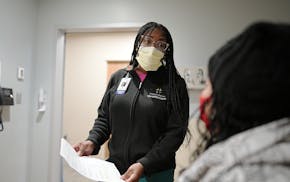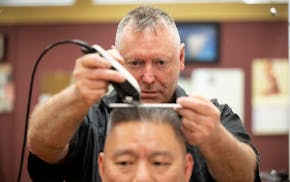Julie Steller in January opened a store in northeast Minneapolis for her handmade apparel business, Steller Handcrafted Goods, which she had nurtured from home for about a dozen years.
Two months later, the pandemic and orders from the state forced her to close.
"I spent two weeks on the couch," Steller said. "I couldn't do anything. I was depressed."
She cut work for her 15 contract tailors, who helped her sew and stitch mittens, caps, cloth purses and other apparel out of old sweaters. She didn't know when business could resume at her just-opened shop and arts fairs, another key path of distribution, were canceled.
"I started making caps and bunnies for matchboxes," Steller recalled. "It was therapeutic."
Steller also made masks from her stock of fabric. She donated them for hard-pressed health care workers at nearby Abbott Northwestern Hospital, and relatives and neighbors.
Steller put a few on a table on her Elliot Park porch. She was surprised to see that people paid for them. Eventually, she decided to start producing thousands of in-demand masks. Back to work for the 15 tailors.
"I spent thousands of dollars on sheets from Target," Steller said. "We advertised on Facebook and Instagram. People bought hundreds of masks [for $8] from our porch and paid in cash or Venmo. My 6-year-old granddaughter drew circles on the sidewalk so people would stay apart. Eureka Recycling ordered 100. I filled one order for 800."
Steller, 62, raised six kids near Bethlehem Baptist Church in Elliot Park. Her husband of 43 years is a semiretired minister. Steller started her business to supplement their modest retirement income.
Last year was her best year, grossing about $150,000 in revenue. She made a little profit for herself thanks to burgeoning online sales at Stellergoods.com, and at festivals and arts fairs.
She opened the tiny store, with rent of $1,400 monthly, at NE. Broadway and NE. Central Avenue, to generate visibility and create a workspace away from the house.
Steller gave her suddenly busy contract sewists a raise this year from $15 to $20 an hour. She was overwhelmed by their tireless work.
"It was the right thing to do,'' she said. "My team was so flexible and courageous."
She hopes mask sales in 2021 will be supplanted by mittens, dresses, caps and other items made mostly of recycled clothing.
"We've also linked up with agencies that serve the homeless and others for neck gaiters with funds raised through SupporttheCities.com," she said "We make them for half the price that Support The Cities paid Amazon."
Steller started in business learning how to make one pair of mittens from a Scandinavian sweater. She's a graduate of nonprofit WomenVenture, the nonprofit business counselor and financier for small, female-owned outfits.
She long ago repaid the $30,000 WomenVenture loaned her in 2013 to buy an industrial-strength sewing machine, retool a website and get a marketing plan. WomenVenture classes taught Steller to interpret the numbers to understand what products were or weren't selling.
WomenVenture this month named her one of its three prized entrepreneurs of the year. Steller won for her resilience and determination.
"I have always loved Julie's great energy and sunny personality," said Kathy Pyle, senior business consultant at WomenVenture. "She has always made an effort to learn more, connect with our services and work hard to make her business successful. She provides important in-home work opportunities for women, and is a tireless cheerleader for other women and woman-owned businesses.''
Steller credits WomenVenture with a multiyear plan to grow and finance the business, and pay down debt during recent good years.
"WomenVenture has helped at each juncture of my growth," Steller said.
Steller chuckles over a few business mistakes over the last decade. That includes spending $10,000 for fabric from the torn Metrodome roof in 2010 to make colorful mittens.
"I paid too much and I made too many," she recalled. "I learned from that. We had fabric and mittens everywhere. We had production issues. I didn't know how to pace things. I learned a lot. We still have some."
Steller considers herself lucky she was able to pivot the business after the pandemic and recession hit. She might even make a buck for the extraordinary effort this year.
"I think I will make money," she said. "I just hope people who bought face masks will come back to the website or store to buy mittens, hats and purses.''
Neal St. Anthony has been a Star Tribune business columnist and reporter since 1984. He can be contacted at nstanthony@startribune.com.

St. Anthony: 'Patient' investing paying off for St. Paul's Hill Capital

Jennifer Smith, leader of Burnsville's Innovative Office Solutions, has died

St. Anthony: Medical professions in Minnesota need more people of color in their ranks



